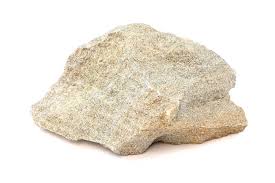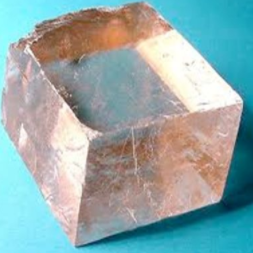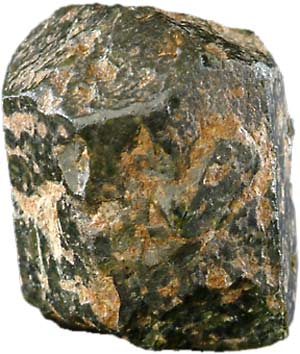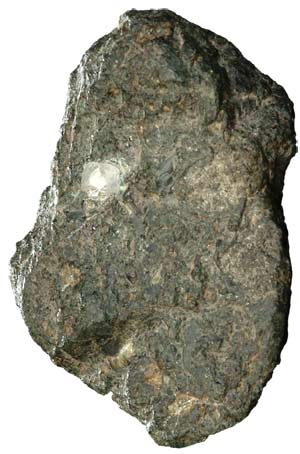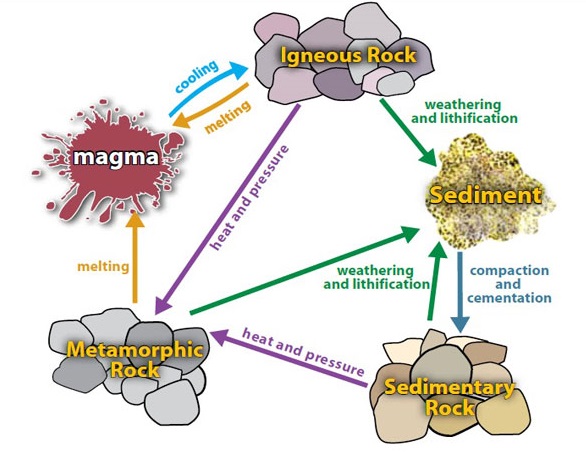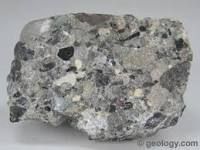We see stones and they appear to be the same throughout our life time. Mountains also appear to not significantly change. So do mountains and stones decompose? What is the life span of a stone? After it alters, what does it turn into?
-
1$\begingroup$ Very much depends on the type of rock, and the environment it's exposed to. Hereabouts (east side of the Sierra Nevada) there's a lot of decomposed granite, which looks like coarse sand. Which is pretty much your answer: sand and soil, mostly. $\endgroup$– jamesqfCommented Feb 12, 2017 at 18:52
-
2$\begingroup$ it depends greatly on the stone. you can pulverize talc in your hand. $\endgroup$– JohnCommented Feb 12, 2017 at 23:10
2 Answers
Mountains and rock do decompose or weather into sediment. A basic rock cycle overview shows the possible pathways between all three rock types (igneous, metamorphic, and sedimentary) how one type can be transformed into another. After a rock is weathered into sediment, that sediment can become a rock again.
Weathering rates of rock vary widely regional based on the following factors:
- Mineral composition of the rock (some minerals are less stable at surface conditions than others)
- Amount of plant life growing on the rocks and mountains. (Plant roots can be powerful chemical and physical weathering agent)
- Amount of precipitation (Chemical dissolution due to rainfall is a significant weathering factor for some rock types (carbonate rocks)
- Seasonal freezing periods. (Ice expansion in cracks and fractures can weaken rocks over very short periods of time.
- Temperature range of the region. (I believe diurnal temperature differentials specially in high mountain deserts has a specific weather impact on some rock types).
- Local earthquakes and volcanic activity.
- Erosion due to water (streams, rivers, lakes, and oceans).
- Erosion due to glaciers and ice flows.
You can get an estimate of weathering rates of different rock types for a local region by careful examination of cemetery gravestones.
-
1$\begingroup$ too add to this rock tends to weather into either sand , silt, or clay depending on the composition and form of weathering. $\endgroup$– JohnCommented Feb 12, 2017 at 23:13
-
1$\begingroup$ Even the strongest rocks on Earth decompose over long time periods, due to weather (rain, heat, mechanical forces). Most mountains are flattened over 50 million years, however certain rocks are still exposed over more than 1 Billion years. You can also find individual time-protected minerals that are older than 3 Billion years. $\endgroup$ Commented Feb 13, 2017 at 18:06
-
$\begingroup$ Can snow protect a mountain from decomposing? We all know that ice helps preserve a thing, but can snow actually help preserve a mountain? Is 50 million years the life of a snow covered mountain or not? $\endgroup$– avito009Commented Feb 23, 2017 at 16:49
-
$\begingroup$ @avito009 maybe that should be another question. $\endgroup$– EeveeCommented Mar 16, 2018 at 20:33
-
$\begingroup$ What about a rock deep in space with no significant radiation from the sun. I'm guessing it would be there even after the sun have died? $\endgroup$– AliCommented Jun 16, 2019 at 16:25
Millions of years.
While it also depends on what kind of rock you're asking about, @GaryKindel's answer above lists a number of other properties a rock has that will effect the time it will take to decompose.
So do mountains and stones decompose?
Yes, they do; but very slowly.
Over millions and sometimes billions of years, a rock will decompose into sediment. As stated above, and then again in @GaryKindel's answer, The rate that they will decompose at really depends on the rock.
For example; two types of rocks that will decompose quickly (still being hundreds of thousands of years or more) are listed below:
Hardness: 2
Hardness: 3
And some rocks that decompose very slowly:
Hardness: 9
Hardness: 10
What is the life span of a stone?
Rocks never die, they just change form. So they don't have a lifespan.
Rocks are always changing form, but too slowly to notice with you're eyes. In fact; rocks aren't even classified as living things. But all rock goes through three main stages:
Metamorphic
Igneous
Sedimentary
The process these rocks go through is called the rock cycle.
There are also some substages:
Magma (Lava; molten rock)
Sediment or soil (microscopic rocks we cannot see; sorta like body cells)
After it decomposes, what does it turn into?
Well, more rock. Just in another stage of the rock cycle.
(usually sedimentary)
As mentioned above, rocks are always changing form, and they do go through a number of substages. But after a rock decomposes, it will become sediment, then after a number of years will compress into a form of sedimentary rock (e.g. Sandstone, shale, etc.).
And as @jamesqf mentioned above, some sedimentary rock can be crushed with your bare hands.
-
$\begingroup$ Nice answer, It would be great to see the names of the different rocks types you show, in addition to their hardness. $\endgroup$ Commented Mar 16, 2018 at 20:36
-
$\begingroup$ Could you help me with that? I can't even see the images, just
Enter image description here$\endgroup$– EeveeCommented Mar 16, 2018 at 20:37 -
$\begingroup$ I wouldn't be able to recognize those rocks. What do you mean by "I can't even see the images"?? $\endgroup$ Commented Mar 16, 2018 at 20:53
-
$\begingroup$ It shows a picture of a little sticky note, and right next to it in linked text is the description. You can't see that? $\endgroup$– EeveeCommented Mar 16, 2018 at 20:55
-
$\begingroup$ Now I see you added the names! (sandstone, calcite, etc...). It looks good to me! $\endgroup$ Commented Mar 16, 2018 at 20:58
